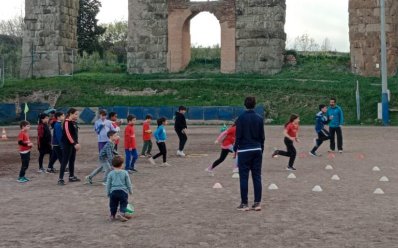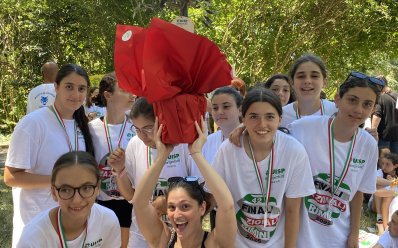Childhood and youth
Sports socialization occurs in the very early years of childhood, in which movement represents a natural expression for the child and he is exposed to the suggestions of a sport that stimulates f imagination and dreams, provides myths and reasons for emulation; in this phase, children are accompanied and supported by their families. A model that also contains distorting phenomena such as championism, the pursuit of victory at all costs and the early specialization. Later in adolescence, when boys and girls are able to assert their point of view towards adults and families, often mature the idea of detachment from sport.
Drop-out, therefore, characterizes in particular the 13–16 age group with a rate of around 30%, and is transversal to all sports disciplines. The factors that determine this gap are multiple, the interference with study, the development of other interests, time spent between social networks and video games (according to research by the SPI - Italian Society of Pediatrics - 4 months out of 12 are spent by young people in this age group with an obsessive use of smartphones), the difficult organization of urban spaces, limited access to adequate areas, insufficient educational support. But is also influential the rejection and intolerance towards sports models proposed in childhood characterized by a strong competitive and selective component, which induce in the kids, together with the pressing expectations of parents and coaches, a sense of frustration and inadequacy.
At the same, time the complexity and pace of everyday life pose obstacles to the adoption of good practice: the economic, technological, social and cultural changes that have occurred in the last 50 years have led to a real revolution in people's daily lifestyles: from mostly walking to the massive use of public or private transport; from carefully prepared food consumed by the family to meals out, in addition to the ever-increasing time spent on computer and video games. All this is reflected in the lifestyles of children and adolescents, who no longer acquire motivated habits for an active and healthy life (let's take into account that already at school age - 6/10 years - the percentage of sedentary people is 23% as shown by the 2012 White Paper on Italian Sport). Furthermore, in adolescence, a sedentary lifestyle not only has negative implications on physical health, but also on cognitive and psychosocial development.
In this context, a sports for all association like UISP can play a proactive role in society, starting on the one hand from its wealth of experience and good practices spread in the field of active lifestyles and, on the other in the area of educational policies and interventions in school and extra-school. It is in fact recognized that " the facilitation of sports practice and the diffusion of sports culture among young people can play a fundamental role in promoting sustainable and healthy behaviors of all age groups of the population, encouraging the recovery of physical activity and the adoption of active lifestyles. The various multipurpose surveys conducted at an international level in recent years, in fact, demonstrate the importance of prevention in young ages, when lifestyles that are harmful to health can begin.
All the projects that UISP carries out for children and young people are characterized by the methodological choice of developing an inter-sectorial approach involving all social actors in a logic network (school, social and health workers, experts, local authorities, associations) and of promoting peer education, which encourages an active and proactive role in young people and a gradual "taking charge" or self-management of activities by young people themselves. This approach, among the long-term results, allows young people to develop reflections and acquire knowledge in full autonomy, turning them into beliefs and values reference that will remain as their heritage.
Uisp has therefore been implementing a coherent path of multi-year preventive awareness campaigns for children and families for years (“("Let's get move", "Ready, Steady, Go!"), becoming part of the “Earning Health” program of the Italian Ministry of Health, with excellent scientifically validated results and a series of projects addressed to young people based on unstructured and postmodern activities such as parkour, street dance, hip hop, sliding sports (sport de la glisse) as skateboarding, scootering, snowboarding, juggling. All activities that respond to their expressive and movement needs.
Child Safeguarding
Uisp wants to be a safe organization for girls, boys and adolescents.
Uisp has specifically addressed the issue of adopting organizational and control models for sports activities and codes of conduct to protect minors since 2003. Thanks to the collaboration with Save the Children, UispS has then adopted, since 2012, its own Policy for the protection of minors in sport and has subsequently joined the "Manifesto 10 in Condotta", a central path for the protection of childhood and adolescence and in the promotion of children's rights.
Uisp has thus developed its own Safeguarding policies for the protection of girls, boys, adolescents and for the prevention and fight against all forms of abuse, harassment, gender violence or discrimination, and a code of conduct to build safe environments that respect the dignity of bodies. These policies contain sanctioning elements but above all proactive behaviors.
Specific attention is also paid on training. In fact, Uisp has been raising awareness throughout the association network on the issues of abuse and violence since 2017, when it included the Child Safeguarding Policy among the topics of the Basic Teaching Units, mandatory for all association training courses.
In terms of internal procedures, Uisp has equipped itself with a National Safeguarding Officer and has provided, in each local branche, the appointment of a person responsible for dealing with abuse, violence and discrimination. Furthermore, collaborators – both voluntary and paid – and managers of Uisp and affiliated sports associations and clubs are required to sign the “Declaration of commitment to respect the Safeguarding Policies” before or at the time of signing an employment contract or voluntary service.
To implement these policies, Uisp has been committed, as a partner, to implementing the project “STePS, a Step ahead for embedding child safeguarding policies in Italy”, promoted by Save the Children, with the contribution of the Department for Family Policies, and carried out in collaboration with CSI.
Ufficio progetti - Sede Uisp Nazionale
L.go Nino Franchellucci, 73 00155 Roma
Tel.: +39.06.43984350 - 345 - 346
Fax: 06.43984320
e-mail: progetti@uisp.it








